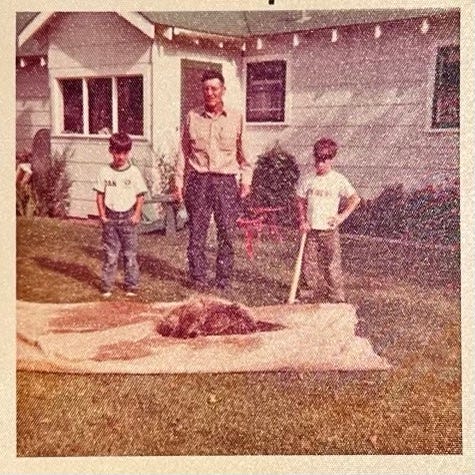In the Noble-prize winning memoir, The Years, Annie Ernaux closely studies her family photographs, painstakingly describing each object from the protective frame and matting wrapped around the photo to the minute image clues that help her reconstruct a moment. She writes as a scientist might, detailing the discovery using precise language, and a keen, impartial eye. The events in the photos are from her own life, and yet, they seem distant — an object that was cast from an original. And of course, that is how our brains recover memories, selecting the past, reconstructing the picture and rewriting the recollection. Each picture is written and rewritten in our memories. Erneux describes a palimpsest sensation, and I can think of no better description of how memories fade like so many pencil marks erased and rewritten.
Dan Wilson’s recollection of his grandpa shooting a porcupine exemplifies this beautifully. The largeness of the child’s memory of his heroic grandfather is retuned by his mother’s recounting, and then, days later modified by his brother’s memory. Our photos capture light and adhered it to paper. As we look at portraits made a generation or two ago, we quickly realize that without context, our photos (like our memories) rely on the storyteller to make the image whole.
Families often have archivist, those people who store the ephemera left by generations of forebearers. Regina Baker must be that person for her people. When she talks about genealogy, her entire face lights up and her wide smile fills the room. She has family pictures around her bunk at Coffee Creek Correctional Facility. When she heard that we were centering the first issue of PonyXpress on ancestry, she was excited to write Catharine’s Grace about her kin Catharine Thomas Baker. It seems Regina has studied the historic photo of Catharine, like a talisman to breathe life into the two-dimensional colorized photograph. Look closely at the photograph, and you will come to know the light in Regina’s smile.
Arriving from Warner Creek Correctional Facility in Lakeview, Forgotten Letter felt like it was written to Catharine Baker. Joel Thompson’s poem could have been folded upon itself and tucked inside a yellowed envelope. He wrote the piece by hand in a cursive that recalled the script of years gone past. We thought the two pieces make excellent companions. | TDS



